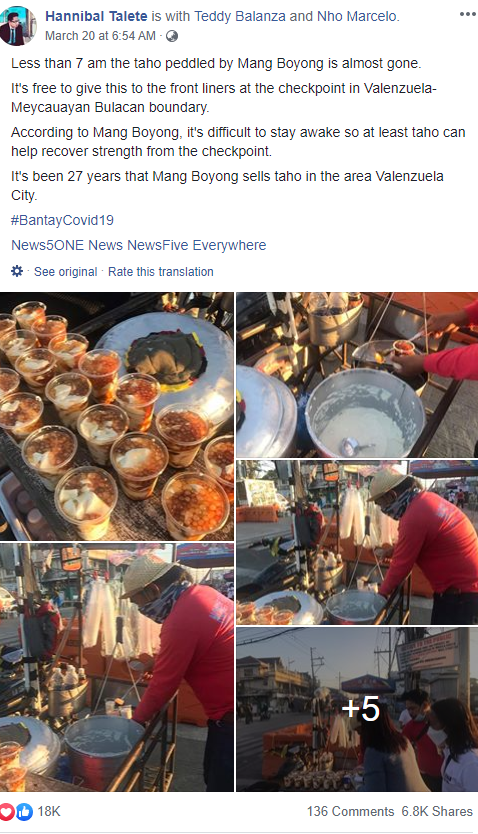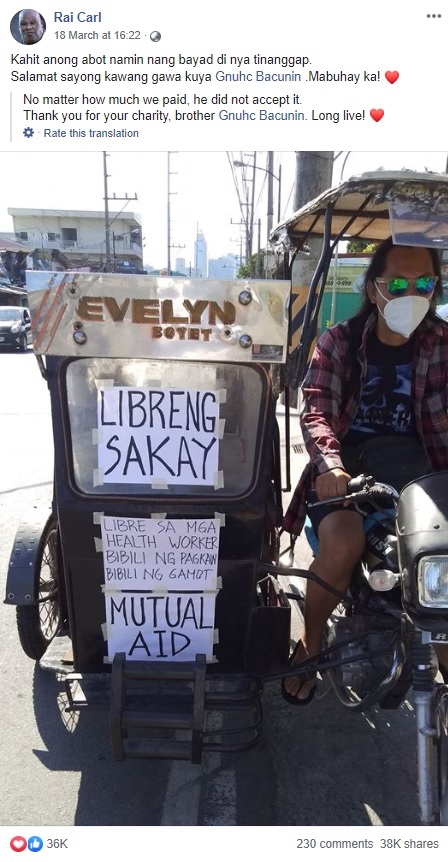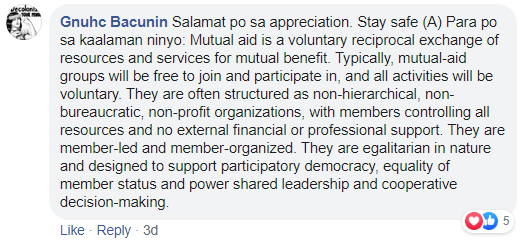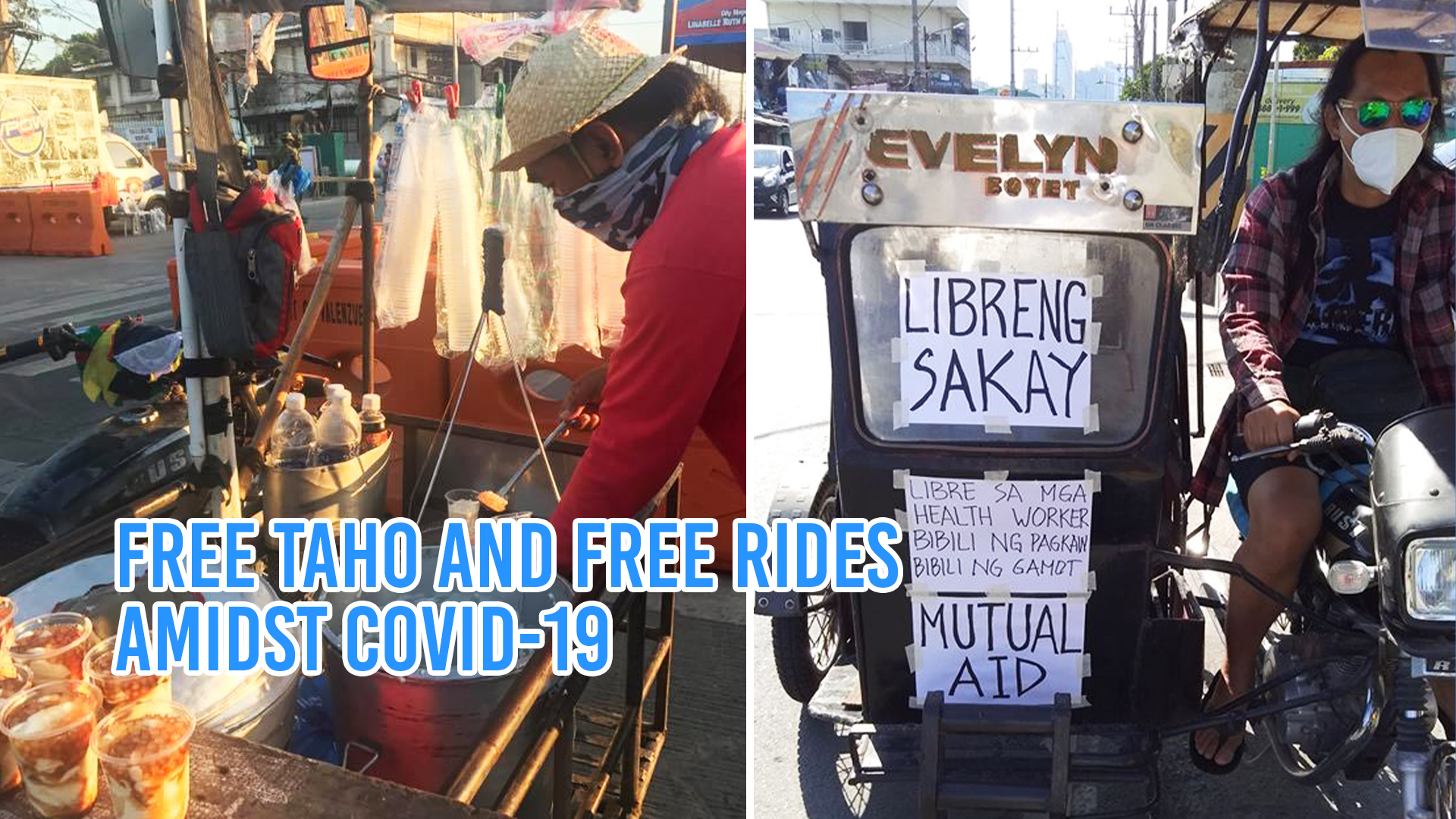Taho vendor and tricycle driver help frontliners
As COVID-19 frontliners work long hours and deal with the pressures of patient care, it’s heartening to see the Philippine community rally around to support them.
But reaching out to our hardworking medical and public service staff in times of crisis, as demonstrated by taho vendor Mang Boyong and tricycle driver Gnuhc Bacunin, is not only exclusive to the rich.
Humble vendors giving what they can to express their appreciation for frontliners

Image credit: Hannibal Talete
Mang Boyong, a taho vendor from Valenzuela in Metro Manila, went out of his way to help others amidst the COVID-19 crisis despite his humble income.
He was spotted giving out cups of free taho to the frontliners manning the checkpoint between Valenzuela and Meycauayan, Bulacan, on 20 March.
To the long-time taho vendor of 27 years, giving out taho for free to frontliners is a way of helping them recover their strength in between sleepless nights. His good deed was witnessed by News5 correspondent Hannibal Talete, who shared photos and videos of the vendor on Facebook in a post that quickly went viral.
‘Heart of gold’ despite having nothing
Facebook user Cherry Morado commented that the vendor has a heart of gold despite his lack of financial and material resources, and wished for the rich to do the same.

Image credit: Cherry Bondad Morada
“It’s how much of what you have you give”

Image credit: Doctor_EVL
Netizen Doctor_EVL from Twitter reflected that it’s not about how much we give, but it’s about how much we contribute from what we have.
Free rides to health workers, people buying necessities
Kindness is also present amidst tricycle drivers. Gnuhc Bacunin, a tricycle driver from Pasig City, went above and beyond by giving free rides to healthcare workers and people buying necessities.

Image credit: Rai Carl
On 18 March, Rai Carl shared a photo of the driver on Facebook. He was seen with his tricycle bearing signs saying “libreng sakay” (free ride), “libre sa mga health worker bibili ng pagkain bibili ng gamot” (free for health workers, people buying food, and people buying medicine), and “mutual aid.”
Along with the photo, Carl also shared that he and his companion insisted on paying Bacunin, but the driver refused to take their payment.
Bacunin responded to Carl’s post, expressing that in a time like this, it’s important to practice cooperation. “Sa oras ng mga ganitong sitwasyon mahalaga isapraktika ang pakikipagkapwa-tulungan,” he posted.
The tricycle driver himself also added a comment on the post, explaining what “mutual aid” meant to him.

Image credit: Gnuhc Bacunin
Bacunin explained that mutual aid “is a voluntary reciprocal exchange of resources and services for mutual benefit”.
He went on to explain the nature of mutual aid groups: free and voluntary to join, lacking a hierarchy, and with all resources controlled by members instead of external parties or companies. The goal of mutual aid groups, to Bacunin, was to support democracy, equality of members, shared leadership, and cooperative decision-making.
We stan a man on the street like him who makes the effort to educate people on the important concept of mutual aid that many may not have known about, but which is all the more relevant in a pandemic where we need to help each other regardless of wealth or rank.
No help is too small amidst a crisis
Indeed, any form of help can go a long way in times of crisis. Frontliners need as much food as they can amidst their sleepless nights, and people who need to commute to work cannot be left on their own, given the closure of our main modes of public transportation.
A cup of taho and a free ride might seem small, but in the grand scheme of things, these are the very things that help glue a crumbling society together.
Also check out:
- 10 things to do while stuck at home
- 3 world pandemics and epidemics that hit the Philippines
- 10 remote working tips
Cover image adapted from: Hannibal Talete, Rai Carl
